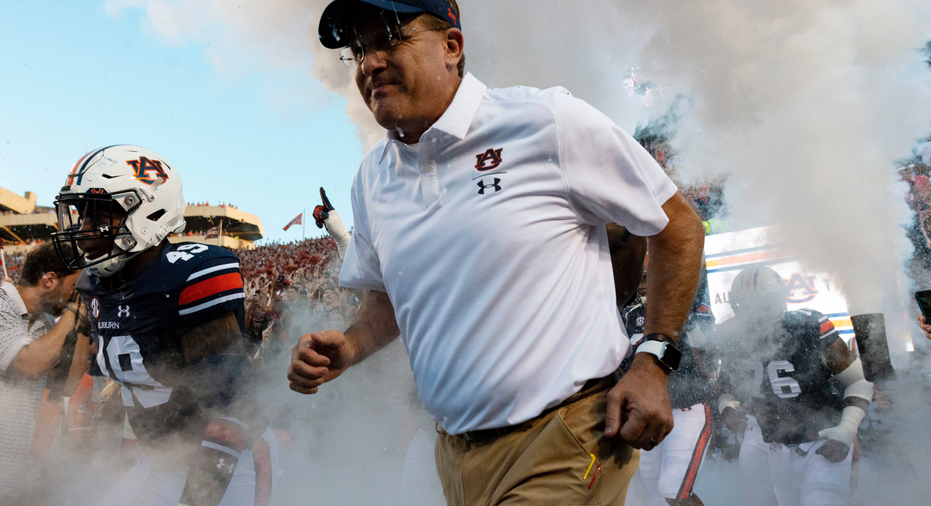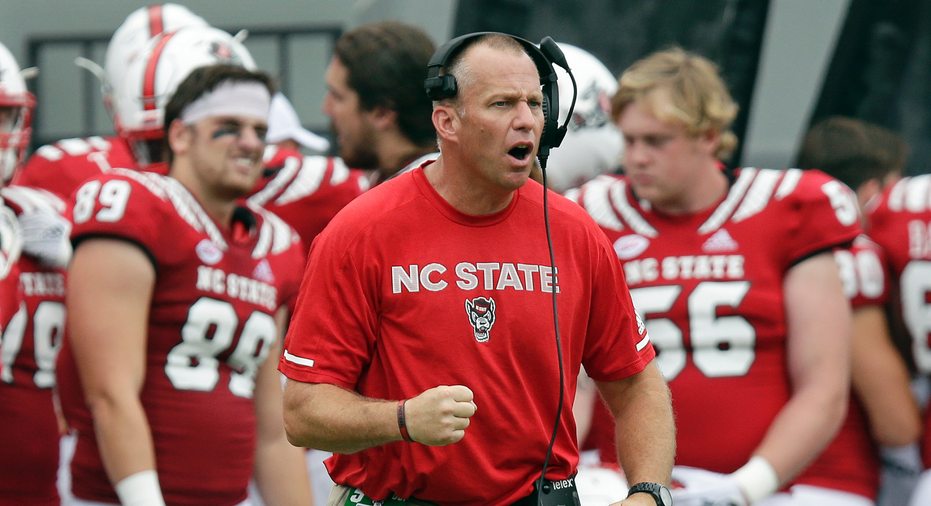Overextended: Why schools rush to extend coach contracts
FILE - In this Saturday, Sept. 8, 2018, file photo, Auburn coach Gus Malzahn takes the field for the team's NCAA college football game against Alabama State, in Auburn, Ala. Malzahn, who just the season before seemed to be in a precarious position with Auburn, received a $49 million, seven-year contract that makes him the fifth-highest paid coach in college football this season, according to USA Today's salary database. (AP Photo/Vasha Hunt, File)
Coming off a division title that included a victory against its archrival, Auburn faced the prospect of losing its coach.
Who knows whether Gus Malzahn really wanted to return to his home state and become the head football coach at Arkansas, another SEC school, but Auburn's leadership decided it did not want to chance it. Malzahn, who just the season before seemed to be in a precarious position with Auburn, received a $49 million, seven-year contract that makes him the fifth-highest paid coach in college football this season, according to USA Today's salary database.
A few months later, Georgia gave Kirby Smart, whose team beat Auburn in the SEC title game and went on to play for the national championship, a similar deal after his second season at the school.
The willingness of schools to modify, amend or re-do the contracts of their football coaches, handing out huge raises and building in hefty severance payments, has helped drive the rapid escalation of salaries in the sport. In many cases, experts say, schools are unnecessarily aggressive in extending a coach, too quick to reward a small sampling of success, out-leveraged by agents, and driven by the fear of having to find a replacement.
"If we have a good coach or we think we do, we're probably better off extending him because if we don't, we have to let him go for whatever reason because he went to greener pastures, well, then we had the one coach that got away and it's going to be expensive for us to pay off all the assistants who otherwise didn't find a job and hire a search firm and hire a new coach and then pay market-grade for that particular coach. I think that that's mistaken," said attorney Bob Lattinville, co-chairman of the St. Louis-based Spencer Fane LLP's collegiate athletics legal team.
Lattinville and his colleague, Roger Denny, did a review of contract extensions for football coaches at Power Five schools between Dec. 1, 2011 and Nov. 31, 2016, and concluded: "College football coach contracts are often prematurely renegotiated."
Between the end of last season and the beginning of this season, 35 FBS schools — including 21 Power Five schools — made some type of amendment to their football coach's contract. In some cases, such as Rutgers with Chris Ash and Minnesota with P.J. Fleck, years were added with no significant change to financial terms.
In other cases, superstar coaches such as Alabama's Nick Saban and Ohio State's Urban Meyer received huge new deals that justifiably put them at the top of their profession when it comes to compensation.
Some of the new contracts were more difficult to explain.
— Pitt gave Pat Narduzzi a new seven-year deal and a raise of more than a million dollars to $3 million in salary this year after going 21-17 over three seasons.
— North Carolina State extended Dave Doeren's contract through the 2022 and raised his salary to over $3 million after last season, his fifth at the school and the first in which he reached nine victories.
— South Carolina re-did Will Muschamp's original five-year deal that paid him $3.1 million last season and handed him to a six-year contract worth $28.2 million after the Gamecocks went 9-4 in his second year at the school.
Lattinville said schools and athletic directors are often rewarding success without properly assessing why that coach was successful.
"What's important now is what happened now," Lattinville said.
"You might be really, really good because you just happened to catch everybody in your division on a down year and you've got a quarterback for the last two years that had the hot hand. Or you've been able to avoid the injury bug," Lattinville added. "There are some things that are far above talent and skill that make up wins. There's luck involved, no doubt about it, and you've got to recognize that. And if you're going to extend somebody — if you're going to exponentially increase their pay — why also exponentially increase their payout when they get let go?"
If Auburn fires Malzahn more than halfway through his new deal, the school is on the hook for $16 million.
College football fans and boosters can be fickle, which causes schools to have little patience with their high-priced coaches. Two early season losses already had some Auburn supporters experiencing buyer's remorse about Malzahn's deal.
But he is 49-25 at Auburn overall and 26-18 in the highly competitive SEC West. He is one of the few coaches to defeat Alabama more than once during Saban's historic 12-season run. Since Malzahn took over in 2013, Auburn has played for two SEC championships and a national championship. There is no guarantee Auburn could find a better coach.
"The reason that we've gotten to this point is the lack of proven talent to be able to go into the major jobs and to be able to secure wins," said Jed Hughes, the head of global sports practice for executive search firm Korn Ferry.
The search for a football coach can put high-profile pressure on an athletic director. In an extreme example of what can go wrong, a fan uprising over the coaching search at Tennessee last year led to athletic director John Currie being replaced. Doeren was one of several coaches approached by Tennessee. He decided to stay put at North Carolina State and got that raise and extension.
Coaching searches are something ADs prefer to avoid.
"Oh, I'm sure there's some of that," Oklahoma AD Joe Castiglione said. "It's also recognizing you might be successful finding a great coach, but recruiting them to a specific campus is an entirely different endeavor altogether. Fans don't realize how difficult that is."
Gerry DiNardo, the former LSU and Indiana coach who is now an analyst for the Big Ten network, has consulted with ADs and coaches on searches.
"There's very few ADs that will wait until a coach has done it in a sustained fashion before they'll pay the millions and millions of dollars," DiNardo said.
Most coaches have agents who are skilled at creating demand — or the appearance of demand — for their client.
"For some reason, we have some large swings in the marketplace and then it seems like a number of (contracts) start to get adjusted based on a wild swing in the marketplace. Whether or not they might be justified," Castiglione said. "But there are other forces at work. I don't mean to sound like I'm commenting against anyone but agents are crafty. They know how leverage works. They can manipulate the marketplace at times to the advantage of their clients. They're doing their jobs."
Army athletic director Boo Corrigan said the work required to make a coaching change extends well beyond the introductory news conference and is another reason schools are motivated to keep their coaches. It takes time to integrate a new staff into the university, from academics to student affairs.
"Every campus has something you're recruiting to and they have to learn what you're recruiting to," Corrigan said.
And now more than ever, athletic directors are tied to the football coaches they hire.
"You make the bad hire and you can end up getting fired," Lattinville said. "If I've got somebody who's good or good enough that's a whole lot better than risking your career on the next hire you make."
___
Follow Ralph D. Russo at www.Twitter.com/ralphDrussoAP and listen at https://www.podcastone.com/AP-Top-25-College-Football-Podcast
___
More AP college football: https://apnews.com/tag/Collegefootball and https://twitter.com/AP_Top25





















